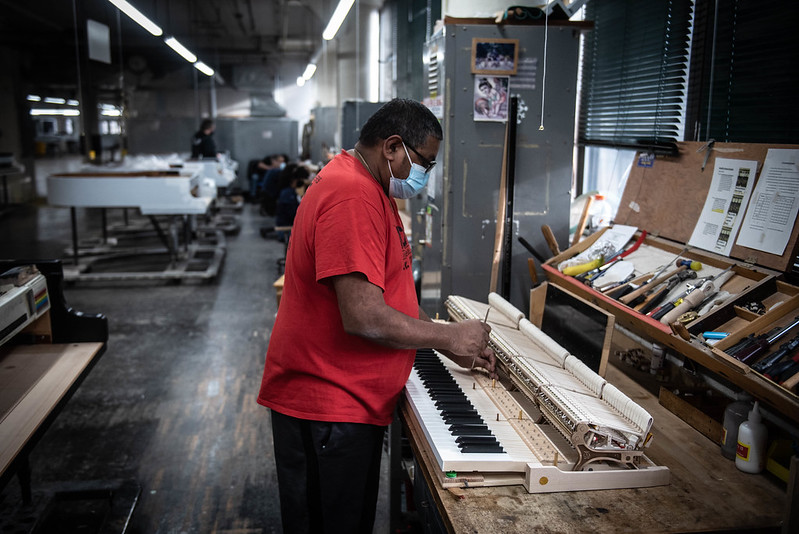
On the job (photo: Michael Appleton/Mayoral Photography Office)
Roughly a decade has passed since New York City experienced crime rates and unemployment rates as high as they are today. That is no coincidence: although crime has many contributing factors, joblessness is a primary cause.
While we need immediate interventions to stop violence now, the best antidote to crime in the long run is a growing and inclusive economy. That is why, as New York recovers from the pandemic, we must invest in workforce development programs that give our young people the chance to choose careers over crime.
This issue is personal for me. Growing up as the son of two community street vendors in Washington Heights, I watched some of my peers make decisions that had a devastating impact for themselves and others. And so, after becoming a first-generation university graduate and receiving my Master in Social Work, I came back to Inwood and Washington Heights to work with at-risk youth.
But today, these communities—and other communities like them—are facing persistent joblessness. Before covid struck, roughly one-in-ten workers in Washington Heights and Inwood worked in a restaurant. With the overall restaurant workforce still 30% below pre-pandemic levels, too many men and women remain out of a job. Other low-wage workers, like those who used to be employed in midtown office buildings, may not see their jobs return for years.
This leaves too many unemployed people, including our youth, looking for some way—any way—to earn a living. Providing these jobless workers with the skills and opportunity to participate in the post-pandemic economy is critical to warding off future violence in our communities.
What we need now is a generational investment in workforce development programs that is guided by three fundamental principles to ensure their success.
First, we must adopt a people-centered approach to workforce development. New York’s current program-centered approach funds a laundry list of initiatives and asks people to navigate their way through them. As a social worker, I know that far too often people fall through the cracks. A people-centered approach would identify unemployed workers and at-risk youth early, understand their needs, and then move them seamlessly from skills-development programs through to job placement.
Second, we must scale up workforce development approaches that we know work. Some of the best workforce development programs in the country were started here in New York City.
For example, Per Scholas—a program that trains young people from low-income families to enter the tech industry—started in the Bronx and has a proven track record of boosting the livelihoods of its graduates. Rather than spreading funding thin across a hodgepodge of programs, New York should invest in expanding programs that succeed.
Third, we must build new partnerships to drive workforce development in our communities. This means partnering with unions, universities, colleges, and businesses so that workforce development programs prepare people for the jobs of today. In addition, we should explore proposals from places like the Center for an Urban Future and Jobs First NYC that would bring real-estate developers to the table so that they contribute to workforce and economic development in the communities where they own buildings.
Of course, a smarter approach to workforce development will be meaningless unless backed by serious cash. That is why I will fight to ensure that Governor Hochul’s budget request for $350 million for workforce development is fully funded in the next state budget.
And, that is why I strongly support Mayor Adams’ recent announcement that New York City will support 100,000 summer job opportunities for young people. When necessary, I will fight for more state money to support initiatives like this. But I will also stand as a watchdog to ensure that those funds are spent wisely so that our young people benefit.
Mayor Adams is fond of quoting the wise words of the recently deceased Archbishop Desmond Tutu: “We need to stop just pulling people out of the river. We need to go upstream and find out why they're falling in.”
Having grown up in Washington Heights and Inwood, and after a career working with at-risk youth in my community, I too am tired of pulling people out of the river. If we make meaningful investments in workforce development today, we can finally limit the number of them falling into the river in the first place.
***
Manny De Los Santos was recently elected to the New York State Assembly to represent the 72nd Assembly District, which includes Washington Heights, Inwood, and Marble Hill. On Twitter @AMDeLosSantos72.
***
Have an op-ed idea or submission for Gotham Gazette? Email This email address is being protected from spambots. You need JavaScript enabled to view it.